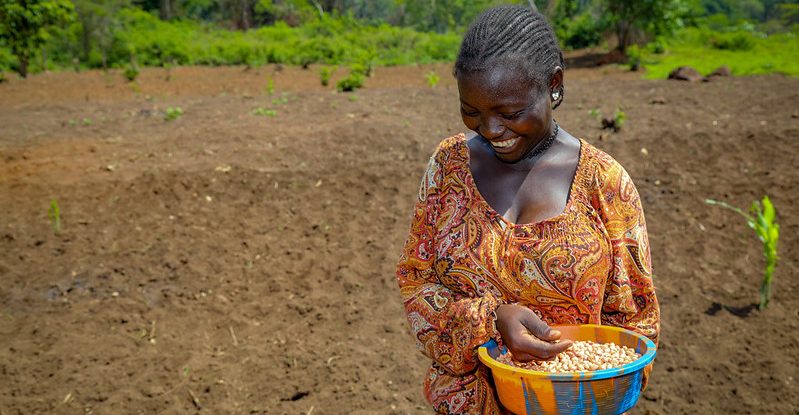From wooded savannahs to the Sahel Desert, from the rocky mountains of Mokolo to the lowlands of the Adamawa Region, the northern regions of Cameroon are both breathtakingly beautiful and critical to the country’s development. They hold vast stretches of pastoral and agricultural landscapes and have significant tourism potential thanks to the presence of unique fauna and flora in local protected areas – such as giraffes, elephants, and aardvarks in the world-famous Waza Biosphere Reserve.
But despite their long list of attributes, these regions face challenging realities. The Adamawa, North, and Far North regions have the lowest human development indicators in the country. In the North Region, for instance, the poverty rate is almost 68 percent – far higher than the national rate of 37 percent – and about 68 percent of people aged 15 or over are illiterate, compared with 30 percent across the country.
These regions are among the least urbanized in Cameroon, and have relatively poor roading infrastructure: for example, it takes five hours to drive 250 kilometres between Garoua (the capital of the North Region) and N’Gaoundéré (the capital of Adamawa), even though it is asphalted.
Added to this under-investment by the state are tensions between the different groups of people that live there. The factors of instability are multiple and complex in their interactions, and only a holistic approach through a territorial landscape-level strategy can attempt to provide sustainable solutions.
Into this milieu, a new EU-funded programme – ‘Green and Resilient Northern Cameroon (CaSeVe)’ – seeks to contribute to stabilizing the northern regions and building the resilience of its vulnerable populations. “I think that [CaSeVe] could indeed prove a possible solution to some of these challenging realities,” said Philippe Leclerc, a rural development programme officer at the European Union delegation in Cameroon, during the programme’s launch on 29 November at the Ribadou Hotel in Garoua.
CaSeVe will focus on two priority issues: agro-sylvo-pastoral and conservation territories. It will also seek to mitigate the negative consequences of landscape-level issues such as climate change, farmer/pastoralist conflicts, poor governance, and administrative shortcomings. These include, notably, the displacement of vulnerable populations – particularly women and young people.
The programme will focus its efforts on three key landscapes: the Logone Valley landscape in the Far North Region, and the Benoue-West and East landscapes, which sit mainly in the North Region with extensions into Adamawa region.
“We are very confident in the CaSeVe programme, and we will do our best to ensure that it produces concrete results,” said Ann Degrande, country coordinator for Cameroon at the Center for International Forestry Research and World Agroforestry (CIFOR-ICRAF), during the launch. CIFOR-ICRAF will play a key role in the first component of the programme – consolidating decentralised governance and coordinating diverse initiatives across the region, alongside other consortium partners.
The second component aims to promote intelligent agro-sylvo-pastoral management in the face of climate change and the increasing scarcity of land suitable for pastoral activities, whilst the final component seeks to support private and public conservation stakeholders in the protection and enhancement of hunting zones and national parks where they are functional, and to identify and then support organisations capable of taking over the management of protected areas that are currently non-functional or in serious difficulty.
Ultimately, the programme seeks to make land-use zoning and management decisions in Northern Cameroon more informed, inclusive, transparent, and respected by their wide range of stakeholders. It aims to restore degraded lands across the focal landscapes and improve the protection of natural heritage.
At the launch, the programme was presented to key stakeholders, including regional and traditional authorities, district delegates, and more. “We truly think that this programme will be a breath of fresh air for the region,” said the governor of the Northern Region, Jean Abate Edi’i, in his address.
Acknowledgements
The CaSeVe programme is implemented in the Adamawa, North and the Far North regions with financial support from the European Union. Component One will be implemented by the CIFOR-ICRAF, Observatoire des Forêts d’Afrique Centrale (OFAC), and Care International consortium. Component Two will be implemented by the Agence Française de Développement (AFD), the Programme de Consolidation et de Pérennisation du Conseil Agropastoral (PCP-ACEFA), the Programme d’Appui à la rénovation et au développement de la formation professionnelle dans les secteurs de l’agriculture, de l’élevage et de la pêche (PCP-AFOP) and the Société de développement du coton du Cameroun (SODECOTON). Component Three will be implemented by the African Wildlife Foundation (AWF), NOE and Conserve Global consortium.
We want you to share Forests News content, which is licensed under Creative Commons Attribution-NonCommercial-ShareAlike 4.0 International (CC BY-NC-SA 4.0). This means you are free to redistribute our material for non-commercial purposes. All we ask is that you give Forests News appropriate credit and link to the original Forests News content, indicate if changes were made, and distribute your contributions under the same Creative Commons license. You must notify Forests News if you repost, reprint or reuse our materials by contacting forestsnews@cifor-icraf.org.
